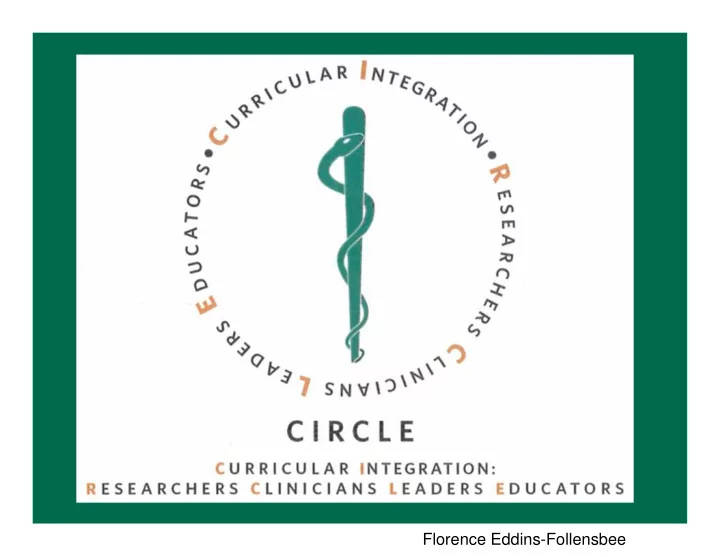

Florence Eddins-Follensbee
Foundational Principles • Clinical integration from day one • Incorporation of active learning • Emphasis on teamwork • Early patient encounters • Individualization of clinical activities • Emphasis on professional identity formation
Educational Techniques Infrequent Lectures Self Instruction Online Learning Flipped Classrooms Shared Courses Clinical/Science Synthesis Interdisciplinary Education Dual Degrees
CIRCLE Clinical Curriculum • Core clerkship experience • Early access to elective rotations • Flexible scheduling over 28 months for: – Research experiences – Global health/community service learning – Dual degree requirements – Exam prep time – Personal activities
Key Components of CIRCLE MS1 Year • Module Coursework • Language of Medicine • Clinical Skills • Weekly Synthesis Case • Technology in Support of Learning
Technology in Support of Learning • Electronic Textbooks - VitalSource • Web-based Audience Response (phone app) • Blackboard Learn • One45 Curriculum Management • ExamSoft computer-based testing • NBME computer-based testing
How will you interact with module coursework? • Each module has a Blackboard site with a calendar embedded with: • Assignments • Searchable discipline themes • Each activity has the following components: • Pre-work • Educational Activity • Post-work
Respiratory Health
Clinical Skills Module • Runs through all preclinical modules. • You will begin seeing patients during your first semester of medical school. • You will know how to perform a complete history and physical exam at the end of your first semester of medical school. • You will then learn to apply these skills to pathologic conditions to generate a differential diagnosis and evaluation of common presenting complaints.
Synthesis Case Curriculum • Every Friday morning, Longitudinal teams • A “ capstone ” case-based clinical reasoning and doctoring skills exercise related to the weekly theme • Facilitated by a clinical (MD) faculty member • Selected for their proven teaching skills • Longitudinal participation with students • “ Coach ” , not “ Grader ”
Module Co-Directors Medicine, Behavior and Society Molecules to Medicine – Molecular Biology Genetics Metabolism Attack and Defense – Immunology and Microbiology Circulation and Hematology
Module Co-Directors Renal and Male Reproduction Mind, Brain and Behavior Endocrine and Female Reproduction Digestive Health and Nutrition Musculoskeletal and Dermatology
Discipline Coordinators Adult Health Anatomy Behavioral Science Child Health EBM/Informatics/Translational Research Ethics Genetics
Discipline Coordinators Histology Microbiology Neurosciences Pathology Pharmacology Public and Preventative Health Physiology Radiology
Recommend
More recommend